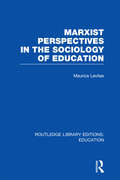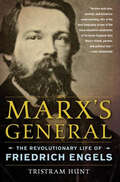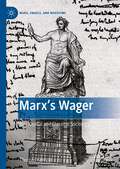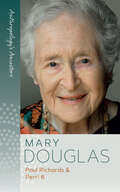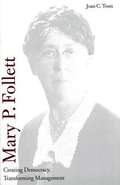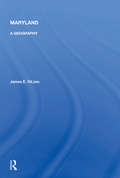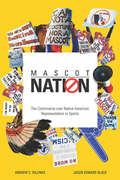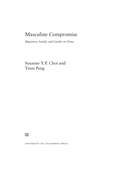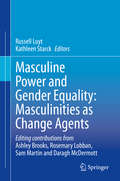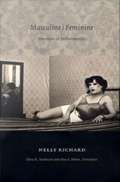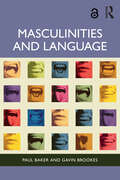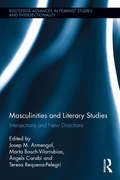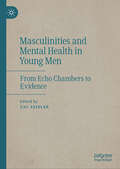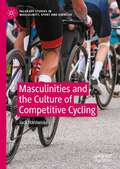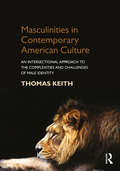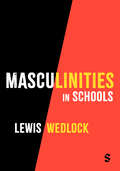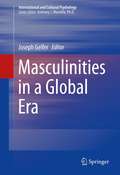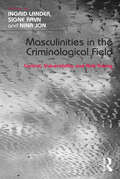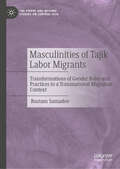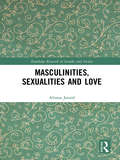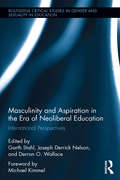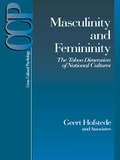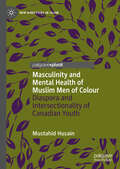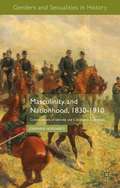- Table View
- List View
Marxist Perspectives in the Sociology of Education (Routledge Library Editions: Education)
by Maurice LevitasThe major theories explored are those concerned with social mobility and those which derive from a relativist position in Sociology, both of which see education as a selection mechanism for a stratified society. Social class, family, sociolinguistics and schools are among the topics discussed. In this analysis the author: defines key areas in the sociology of education gives access to important concepts of Marx and Engels strengthens sociological starting points by adding a Marxist element discriminates between radically different directions in education maps the main features of long-term working class goals This thoroughgoing Marxist critique of widely prevalent notions in the sociology of education provides a compass by which place and direction in this area of education may be found by students, teachers and parents.
Marx’s General: The Revolutionary Life of Friedrich Engels
by Tristram HuntFriedrich Engels is one of the most intriguing and contradictory figures of the nineteenth century. Born to a prosperous mercantile family, he spent his life enjoying the comfortable existence of a Victorian gentleman; yet he was at the same time the co-author of The Communist Manifesto, a ruthless political tactician, and the man who sacrificed his best years so that Karl Marx could have the freedom to write. Although his contributions are frequently overlooked, Engels's grasp of global capital provided an indispensable foundation for communist doctrine, and his account of the Industrial Revolution, The Condition of the Working Class in England, remains one of the most haunting and brutal indictments of capitalism's human cost. <p><p>Drawing on a wealth of letters and archives, acclaimed historian Tristram Hunt plumbs Engels's intellectual legacy and shows us how one of the great bon viveurs of Victorian Britain reconciled his exuberant personal life with his radical political philosophy. This epic story of devoted friendship, class compromise, ideological struggle, and family betrayal at last brings Engels out from the shadow of his famous friend and collaborator.
Marx’s Wager: Das Kapital and Classical Sociology (Marx, Engels, and Marxisms)
by Thomas KempleMarx's masterpiece Capital (Das Kapital) ignored or misread as well as selectively and creatively interpreted by the generation of social scientists that came after him. Emile Durkheim, Max Weber, and Georg Simmel attempt to supplement what they call ‘historical materialism’ or to engage in debates about ‘socialism’ through their readings of The Communist Manifesto and occasional Capital. Although these and other classical sociologists did not have access to most of Marx’s published and unpublished works as we do today, each is concerned with revising and refining Marx’s unfinished critique of political economy. Despite their differences with Marx and with one another, they share his concern with how empirically detailed and scientifically valid knowledge of the social world may inform historical struggles for a more human world. This commitment can be called ‘Faustian’, after the title character of the poet J. W. von Goethe’s tragic epic of modernity, insofar as Marx and the classical sociologists hope to translate theory into practice while making a pact or wager with the diabolical social, political, and economic forces of the modern world.
Mary Douglas (Anthropology's Ancestors #4)
by Perri 6 Paul RichardsThis handy, concise book covers the life of Mary Douglas, one of the most important anthropologists of the second half of the 20th century. Her work focused on how human groups classify one another, and how they resolve the anomalies that then arise. Classification, she argued, emerges from practices of social life, and is a factor in all deep and intractable human disputes. This biography offers an introduction to how her distinctive approach developed across a long and productive career and how it applies to current pressing issues of social conflict and planetary survival. From the Preface: The influence of Professor Dame Mary Douglas (1921-2007) upon each of the social sciences and many of the disciplines in the humanities is vast. The list of her works is also vast, and this presents a problem of choice for the many readers who want to get a general idea of what she wrote and its significance, but who are somewhat baffled about where to begin. Our book offers a short overview and suggests why her key writings remain significant today.
Mary P. Follett: Creating Democracy, Transforming Management
by Joan C. TonnMary P. Follett (1868-1933) brought new dimensions to the theory and practice of management and was one of America's preeminent thinkers about democracy and social organization. The ideas Follett developed in the early twentieth century continue even today to challenge thinking about business and civic concerns. This book, the first biography of Follett, illuminates the life of this intriguing woman and reveals how she devised her farsighted theories about the organization of human relations. --BOOK JACKET. Title Summary field provided by Blackwell North America, Inc. All Rights Reserved
Maryland: A Geography
by James E. DiLisioAlthough one of the smallest of the fifty states, in many ways Maryland is the United States in miniature, bringing together and exemplifying the diverse elements of the country. In it the North and the South meet, and Maryland is one of the original gateways to the West. Maryland is a study in contrasts, combining the poverty of the Appalachian hill people, the sharecroppers of the South, and the inner-city dwellers of Baltimore with the affluence of country manor estates and fashionable suburbs. Some of America's most rural scenes are interspersed there with some of its largest metropolitan centers. Added to this is a great physical diversity—the Coastal Plain, the Piedmont, the Delmarva Peninsula, the Chesapeake Bay, and the Appalachian Highlands. This book provides an analytical survey of the physical, social, cultural, and economic geography of Maryland. Though the emphasis is on human geography, significant attention is given to the physical base on which the cultural landscape has developed. Environmental issues, such as Chesapeake Bay pollution, coal mining in Western Maryland, and the urbanization of the beaches, are addressed to show how development has often led to conflicts between people and their environments.
Mascot Nation: The Controversy over Native American Representations in Sports
by Jason Edward Black Andrew C. BillingsThe issue of Native American mascots in sports raises passions but also a raft of often-unasked questions. Which voices get a hearing in an argument? What meanings do we ascribe to mascots? Who do these Indians and warriors really represent? Andrew C. Billings and Jason Edward Black go beyond the media bluster to reassess the mascot controversy. Their multi-dimensional study delves into the textual, visual, and ritualistic and performative aspects of sports mascots. Their original research, meanwhile, surveys sports fans themselves on their thoughts when a specific mascot faces censure. The result is a book that merges critical-cultural analysis with qualitative data to offer an innovative approach to understanding the camps and fault lines on each side of the issue, the stakes in mascot debates, whether common ground can exist and, if so, how we might find it.
Masculine Compromise
by Susanne Yuk-Ping Choi Yinni PengDrawing on the life stories of 266 migrants in South China, Choi and Peng examine the effect of mass rural-to-urban migration on family and gender relationships, with a specific focus on changes in men and masculinities. They show how migration has forced migrant men to renegotiate their roles as lovers, husbands, fathers, and sons. They also reveal how migrant men make masculine compromises: they strive to preserve the gender boundary and their symbolic dominance within the family by making concessions on marital power and domestic division of labor, and by redefining filial piety and fatherhood. The stories of these migrant men and their families reveal another side to China's sweeping economic reform, modernization, and grand social transformations.
Masculine Power and Gender Equality: Masculinities As Change Agents
by Russell Luyt Kathleen StarckThis book explores how political institutions can challenge dominant and normative masculinities, guiding thinking instead toward a transformation of gendered power structures and general equality. Representing a range of relevant areas, the expert chapter authors provide various methodological and theoretical approaches applied to shifting gender meanings in cultural, national, and social contexts. Authors also represent a variety of cultures, contributing to the multi-perspective debate about how best to achieve gender equality in the real world.Among the topics discussed:Reimagining masculinities, their everyday practice and practical interventions Towards a feminist theory of male rapePolitical implications of challenging men’s everyday practices through domestic violence primary prevention workMen as allies: a case study of White Ribbon AustraliaMasculine Power and Gender Equality: Masculinities as Change Agents provides valuable insight into strategies for re-imagining male-dominated power structures and promoting gender equality.
Masculine/Feminine: Practices of Difference(s)
by Nelly RichardNelly Richard is one of the most prominent cultural theorists writing in Latin America today. As a participant in Chile's neo-avantgarde, Richard worked to expand the possibilities for cultural debate within the constraints imposed by the Pinochet dictatorship (1973-1990), and she has continued to offer incisive commentary about the country's transition to democracy. Well known as the founder and director of the influential Santiago-based journal Revista de crítica cultural, Richard has been central to the dissemination throughout Latin America of work by key contemporary thinkers, including Néstor García Canclini, Jacques Derrida, Fredric Jameson, and Diamela Eltit. Her own writing provides rigorous considerations of Latin American identity, postmodernism, gender, neoliberalism, and strategies of political and cultural resistance. Richard helped to organize the 1987 International Conference on Latin American Women's Literature in Santiago, one of the most significant literary events to take place under the Pinochet dictatorship. Published in Chile in 1993, Masculine/Feminine develops some of the key issues brought to the fore during that landmark meeting. Richard theorizes why the feminist movement has been crucial not only to the liberation of women but also to understanding the ways in which power operated under the military regime in Chile. In one of her most widely praised essays, she explores the figure of the transvestite, artistic imagery of which exploded during the Chilean dictatorship. She examines the politics and the aesthetics of this phenomenon, particularly against the background of prostitution and shantytown poverty, and she argues that gay culture works to break down the social demarcations and rigid structures of city life. Masculine/Feminine makes available, for the first time in English, one of Latin America's most significant works of feminist theory.
Masculinities and Language
by Paul Baker Gavin BrookesToday, the topic of gender identity is being discussed more widely than ever before. With the rise of online misogyny and in the wake of #metoo, language around masculinity and toxic masculinity merits closer examination. Accessibly written by two leading linguists, this book provides a comprehensive treatment of the debates around language and masculinity, asking how language is used to perform masculinity and how language is used to represent men.Including examples of research from a range of international scholars, along with original case studies and engaging examples from popular culture, media, literature, advertising and politics, the authors address a wide range of theoretical and methodological standpoints. The book examines concepts of gender performativity, hegemonic masculinity and queer theory, drawing on disciplines and methods including conversation analysis, phonetics, ethnography, interviews, focus groups, visual analysis, discourse analysis, critical discourse studies and corpus linguistics. Situating male language use in terms of power, dominance and subordination, the book concludes with an examination of the more recent concepts of toxic masculinity and healthy masculinity, exploring critical stances towards and around language used by men.This book demonstrates the role that linguistic research can play in addressing real-world problems associated with masculinity – problems experienced by people of all genders and the natural world more broadly. Masculinities and Language is vital reading for scholars, researchers and students of language and gender, sexuality, identity, discourse analysis and sociolinguistics within linguistics, English language and related areas.The Open Access version of this book, available at http://www.taylorfrancis.com, has been made available under a Creative Commons Attribution-Non Commercial-No Derivatives (CC BY-NC-ND) 4.0 license.
Masculinities and Literary Studies: Intersections and New Directions (Routledge Advances in Feminist Studies and Intersectionality)
by Teresa Requena Àngels Carabí Josep M. Armengol Marta Bosch VilarrubiasAs more and more work is being done in the name of the ever-growing field of study of literary representations of masculinities, it seems timely to not only review its development and main contributions to the larger field of masculinity studies, but also to look at its latest advances and new directions. These are precisely the two main aims of Masculinities and Literary Studies, which seeks to explore the conjunction between these two fields while exploring some of the latest developments and new directions resulting from such intersections. If much of the existing masculinity scholarship has traditionally been grounded in a specific discipline, this volume also seeks to provide an innovative methodological approach to the subject of literary masculinities by proving the applicability of the latest interdisciplinary masculinity scholarship - namely, sociology, social work, psychology, economics, political science, ecology, etc. - to the literary analysis, thus crossing the traditional boundary between the Social Sciences and the Humanities in new and profound ways. Presenting the latest advances in masculinity scholarship, this interdisciplinary book will appeal to gender and masculinity scholars from a wide variety of fields, including sociology and social work, psychology, philosophy, political science, and cultural and literary studies.
Masculinities and Mental Health in Young Men: From Echo Chambers to Evidence
by Zac SeidlerThis book seeks to understand young men’s mental health by going to the places and spaces where they spend their time. It is essential reading for researchers, clinicians, policymakers and members of the general public who care about men’s wellbeing. Each chapter focuses on the contemporary nexus between masculinities and health, encompassing alcohol, gambling, sport, gaming, social media, pornography, and dating apps, to explore how and why these areas are central to young men’s lives and their health. Addressing the present day ‘crisis of masculinity’, this edited volume comprises a series of up-to-date reviews to emphasise strength-based, healthy masculinities in young men’s mental health. It seeks to understand and engage with research, policy, and practice to co-design effective interventions supporting young men, presenting a clear agenda to direct future efforts.
Masculinities and the Culture of Competitive Cycling (Palgrave Studies in Masculinity, Sport and Exercise)
by Jack HardwickeDrawing on extensive ethnographic, qualitative and quantitative research, this monograph provides a novel account of masculinities in an individual sport: competitive road cycling. Chapters present varied analyses on male cyclists’ relationship with masculinity, the culture of competitive road cycling, cyclists’ attitudes toward injury management, sexual minority and women’s experiences in the sport, and autoethnographic accounts of the author’s own experiences of being involved in the sport for over ten years. The author also examines how masculinity impacts male cyclists’ attitudes towards competition, risk taking and doping practices. This book will be of interest to scholars and researchers in sports sociology, gender studies, and masculinity studies.
Masculinities in Contemporary American Culture: An Intersectional Approach to the Complexities and Challenges of Male Identity
by Thomas KeithMasculinities in Contemporary American Culture offers readers a multidisciplinary, intersectional overview of masculinity studies that includes both theoretical and applied lenses. Keith combines current research with historical perspectives to demonstrate the contexts in which masculine identities have come evolved. With an emphasis on popular culture -- particularly film, TV, video games, and music -- this text invites students to examine their gendered sensibilities and discuss the ways in which different forms of media appeal to toxic masculinity.
Masculinities in Schools
by Lewis WedlockTeachers are struggling with issues and conversations around masculinities in schools. How do we discuss problem areas associated with masculinities, without demonising the young men we are engaging with? How do we create safe spaces for young people to discuss and challenge their masculinities together? It has never been harder to engage young men in conversations about masculinity, and it has never been more confusing to know where to start. Educator and social scientist Lewis Wedlock enables schools and teachers to grow their confidence in exploring masculinities with young people. He challenges limiting ideas of masculinity and takes a compassionate, restorative approach. Through this book, Lewis supports teachers to deepen their understanding of how masculinities are shaped, to explore the many complexities and to get comfortable with the uncertainties. He offers practical guidance for the classroom and for transformative, community centred interventions. He empowers teachers to feel confident in implementing sustainable, flexible, and constantly mendable models of masculinity. The subject of masculinities is often approached through a lens of ‘toxicity’, prompting disengagement and disconnection. This book takes a different approach. It is not about polarizing, demonizing, or standardizing masculinities. It supports and advocates for schools to be open to the wide diversity of masculinities and to develop cultures of accountability, integrity, authenticity, and pride.
Masculinities in Schools
by Lewis WedlockTeachers are struggling with issues and conversations around masculinities in schools. How do we discuss problem areas associated with masculinities, without demonising the young men we are engaging with? How do we create safe spaces for young people to discuss and challenge their masculinities together? It has never been harder to engage young men in conversations about masculinity, and it has never been more confusing to know where to start. Educator and social scientist Lewis Wedlock enables schools and teachers to grow their confidence in exploring masculinities with young people. He challenges limiting ideas of masculinity and takes a compassionate, restorative approach. Through this book, Lewis supports teachers to deepen their understanding of how masculinities are shaped, to explore the many complexities and to get comfortable with the uncertainties. He offers practical guidance for the classroom and for transformative, community centred interventions. He empowers teachers to feel confident in implementing sustainable, flexible, and constantly mendable models of masculinity. The subject of masculinities is often approached through a lens of ‘toxicity’, prompting disengagement and disconnection. This book takes a different approach. It is not about polarizing, demonizing, or standardizing masculinities. It supports and advocates for schools to be open to the wide diversity of masculinities and to develop cultures of accountability, integrity, authenticity, and pride.
Masculinities in a Global Era
by Joseph GelferMasculinities in a Global Era extends the conversation of masculinity studies by analyzing global masculinities from a psychological perspective. Canvassing a broad array of psychological aspects such as the construction of identity, the negotiation of power, coping with trauma, and sexuality, this volume shows how masculinities are experienced, performed and embodied in geographically dispersed communities. Importantly, Masculinities in a Global Era fulfills a much-needed but elusive need within the study of masculinities: a forum in which the often polarized approaches of pro-feminists and men's rights advocates can begin to move beyond their entrenched historical positions towards a more fruitful and nuanced future.
Masculinities in the Criminological Field: Control, Vulnerability and Risk-Taking
by Signe Ravn Ingrid LanderOver recent decades criminological research has changed from a gender-blind discipline which equated crime with men and thus ignored questions about gender, to an approach that studied gender by showing statistical differences between men and women, and then finally to a more inclusive and elaborate gender-theoretical approach to crime and crime control. However, despite this development, research on gender - and in particular research on gendered norms and the construction and enactment of masculinities - within the criminological field has been unable to keep up with developments in gender research. Since 1990, only a few anthologies with a gender-theoretical orientation focusing on masculinities within the criminological research field have been published. Many of the theoretical developments in gender research still have difficulties in reaching into mainstream criminology, partly because such developments are often published in feminist and/or gender theoretical journals. This volume both problematizes and renders visible conceptions and norms regarding male behaviour and masculinities and shows how these affect the criminological field through providing a theoretically sound and clear gender perspective to this field of research. With sections based around the following three themes: negotiations of masculinity in institutional settings, vulnerable masculinities and risk-taking and masculinities, this volume will be of interest to scholars of criminology, sociology, social work and gender studies, as well as policy-makers, and law enforcement professionals.
Masculinities of Tajik Labor Migrants: Transformations of Gender Roles and Practices in a Transnational Migration Context (The Steppe and Beyond: Studies on Central Asia)
by Rustam SamadovThis book explores masculinities of Tajik men and offers insights on how migrant and non-migrant men maintain their gender identity and adjust their gender practices in the context of transnational labor migration from Tajikistan to Russia. Being in the state of transnational in-betweenness, Tajik non/migrant men and often their spouses need to adapt to gender norms of both Russian and Tajik gender orders despite the orders' very different and at times contradicting gender requirements. Therefore, the book provides the first comprehensive analysis of Tajik non/migrant men's masculinities and their navigation between various forms of masculinity: hegemonic, complicit, marginalized, protest and dominant, thereby performing flexible and strategic masculinity. While focusing on migrant men, this research also highlights the role of women in sustaining their partners' masculine image and the ways how Russian women adjust their gender practices in response to the requirements of Tajik society.
Masculinities, Sexualities and Love (Routledge Research in Gender and Society)
by Aliraza JavaidIt can be said that societies today know little of how gender, sexuality and love interconnect in dissimilar contexts, and how they are collectively shaped by social structures. Underpinned by the theoretical writings of Michel Foucault, Masculinities, Sexualities and Love examines a range of empirical data, including interviews with gay and bisexual men, to understand the ways in which love is constructed and conceptualized. Clearly written, the book is grounded in personal narratives and intimate stories of love, hurt, pain and heartbreak, including the author’s own experiences; and analysed using theoretical frameworks such as hegemonic masculinity, heteronormativity, and post-structuralism. Furthermore, the reader will also find insightful discourse analysis of popular films, such as Fifty Shades of Grey and The Girl on the Train, to examine the construction of love through film. Forming a timely intervention, Masculinities, Sexualities and Love offers a fresh perspective on the sociology of love and will appeal to students and researchers interested in fields such as Gender and Sexuality Studies, Cultural Studies and Sociology.
Masculinity and Aspiration in an Era of Neoliberal Education: International Perspectives (Routledge Critical Studies in Gender and Sexuality in Education)
by Garth Stahl Derron Wallace Joseph NelsonThis collection investigates the ways in which boys and young men negotiate neoliberal discourse surrounding aspiration and how neoliberalism shapes their identities. Expanding the field of masculinity studies in education, the contributors offer international comparisons of different subgroups of boys and young men in primary, secondary and university settings. A cross-sectional analysis of race, gender, and class theory is employed to illuminate the role of aspiration in shaping boys’ identities, which adds nuance to their complex "identity work" in neoliberal times.
Masculinity and Femininity: The Taboo Dimension of National Cultures (Cross Cultural Psychology)
by Geert HofstedeIn 1980, Geert Hofstede published his monumental work CultureÆs Consequences, which laid out four dimensions on which the differences among national cultures could be understood: individualism, power distance, uncertainty avoidance, and masculinity. Since then much research has been conducted and presented on individualism/collectivism but until now, no single volume has focused on the masculinity dimension of the model. In Masculinity and Femininity, Hofstede has expanded, sharpened, and deepened the discussion of masculinity and femininity. This new volume presents the first thoroughly developed discussion of this dimension and how it can help us understand the differences among cultures. It begins with a general explanation of masculinity and discusses how it illuminates broad features of different cultures. It then applies the dimension more specifically to gender, sexuality, and religion. Finally, the book examines how the masculinity dimension reveals a lot about a cultureÆs expressions of religious ideas, the importance its citizens attach to religion, and the way religious concepts are understood. Intended as a companion volume to KimÆs Individualism and Collectivism, this important volume will be of interest to those teaching courses such as cross-cultural psychology, international social welfare, international business, womenÆs studies, cultural studies, and the psychology of women.
Masculinity and Mental Health of Muslim Men of Colour: Diaspora and Intersectionality of Canadian Youth (New Directions in Islam)
by Mustahid HusainThis book delves into the complexities of masculinity, mental health, and cultural identity among young Bangladeshi-Canadian men. Employing an anthropological, intersectional approach, it scrutinizes the interplay of neoliberal ideologies, Islamic values, and diasporic experiences in shaping their masculine trajectories. The study unravels the intergenerational trauma, parental pressures, and societal expectations that contribute to their deteriorating mental well-being. With a unique insider perspective and rich empirical data, this book fills a crucial gap in the literature by offering invaluable insights for scholars exploring the nuances of migration, ethnicity, gender, and psychological resilience. Strikingly, the author proposes evidence-based interventions and policy recommendations to address the mental health struggles of this underserved population, making it a must-read for academics and students in diaspora studies, migration studies, sociology of race and ethnicity, gender studies, anthropology, political science and development studies, as well as NGOs and policymakers alike.
Masculinity and Nationhood, 1830-1910
by Josephine HoegaertsA history of what it meant to be a man, and a citizen of an emerging nation throughout the nineteenth century. This book not only relates how Belgians were taught how to move and fight, but also how they spoke and sang to express masculinity and patriotism.
